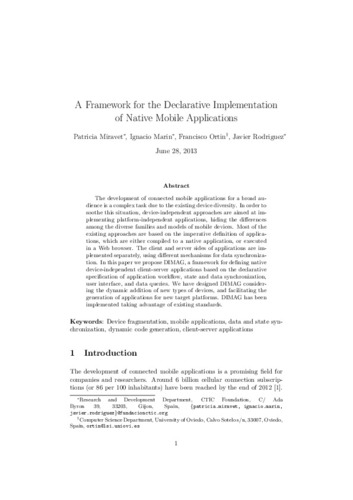Framework for the declarative implementation of native mobile applications
Autor(es) y otros:
Fecha de publicación:
Editorial:
IET (Institution of Engineering and Technology)
Versión del editor:
Citación:
Descripción física:
Resumen:
The development of connected mobile applications for a broad audience is a complex task because of the existing device diversity. In order to soothe this situation, device-independent approaches are aimed at implementing platform-independent applications, hiding the differences among the diverse families and models of mobile devices. Most of the existing approaches are based on the imperative definition of applications, which are either compiled to a native application, or executed in a Web browser. The client and server sides of applications are implemented separately, using different mechanisms for data synchronisation. In this study, the authors propose device-independent mobile application generation (DIMAG), a framework for defining native device-independent client-server applications based on the declarative specification of application workflow, state and data synchronisation, user interface and data queries. The authors have designed DIMAG considering the dynamic addition of new types of devices, and facilitating the generation of applications for new target platforms. DIMAG has been implemented taking advantage of existing standards
The development of connected mobile applications for a broad audience is a complex task because of the existing device diversity. In order to soothe this situation, device-independent approaches are aimed at implementing platform-independent applications, hiding the differences among the diverse families and models of mobile devices. Most of the existing approaches are based on the imperative definition of applications, which are either compiled to a native application, or executed in a Web browser. The client and server sides of applications are implemented separately, using different mechanisms for data synchronisation. In this study, the authors propose device-independent mobile application generation (DIMAG), a framework for defining native device-independent client-server applications based on the declarative specification of application workflow, state and data synchronisation, user interface and data queries. The authors have designed DIMAG considering the dynamic addition of new types of devices, and facilitating the generation of applications for new target platforms. DIMAG has been implemented taking advantage of existing standards
Identificador local:
20141158
Patrocinado por:
This work has been partially funded by the European Commission’s Seventh Framework Programme under grant agreement number 258030 (FP7-ICT-2009-5; Internet of Services, Software and Virtualisation STREP). The authors have also received funds from the Department of Science and Technology (Spain) under the National Programme for Research, Development and Innovation: project TIN2011-25978 entitled ‘Obtaining Adaptable, Robust and Efficient Software by including Structural Reflection to Statically Typed Programming Languages’.
Colecciones
- Artículos [37550]
- Informática [875]
- Investigaciones y Documentos OpenAIRE [8421]
Ficheros en el ítem




